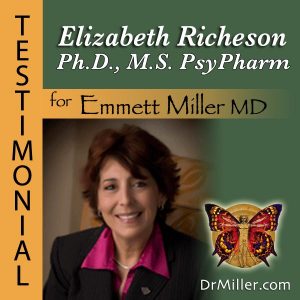Presented at the Society of Behavioral Medicine, Ninth Annual Scientific Sessions, Boston, April 28, 1988
By William B. Collinge, Ph.D., M.P.H. http://www.collinge.org/Csec.
Cancer Support and Education Center, Menlo Park, CA
Programs using psychosocial intervention comprise a major portion of approaches intended to complement medical treatment of cancer. The effectiveness of such programs has been described as “equivocal”, and empirical studies are needed to establish benefits before they can be widely recommended.
Sample
Fifty-nine patients with cancer at various sites and stages, seeking complementary therapy on their own initiative, participated in this study. Two-thirds were female, 61% reported metastatic disease, and 83% believed stress plays a role in cancer. Mean age was 49 years (SD=12, range of 21 to 82). Subjects were interviewed before intervention, at one-week and three-month follow-ups.
Intervention
Intervention included 63 hours of thematic group processes and self-help training in healing imagery, relaxation, stress reduction, communication, emotional release, and lifestyle change. Patients also received four individual counseling sessions, nutrition consultation, and nine massage therapy sessions. Two formats were offered: one day per week for nine weeks (N=29), and a two-week intensive (N=30).
Instruments
Self-report instruments included the Psychological Adjustment to Cancer Scale, the Courtauld Emotional Control Scale, the Functional Living Index: Cancer, the Life Regard Index, and the Norbeck Social Support Questionnaire; and a set of questions about frequency and types of self-help practices.
Results
Significant findings at three-month follow-up included improvements in functional living (p<.01), emotional expression (anger, fear, unhappiness) (p<.001), sense of meaningful life (p<.001), sense of fulfillment in life (p<.001), positive life regard (p<.001), perceived control over health (p<.001), optimism for recovery (p<.001), self-help activity (p<.001), perceived affirmation by support network (p<.05), perceived benefit of the intervention program (p<.05), and decrease in network size (p<.05).
The proportion of patients with fighting spirit as dominant mode of adjustment increased (p=.082), and with helplessness decreased (p=.019). About half the patients began the study with fighting spirit as their dominant mode of adjustment, and 79% of the others progressed to either exclusive or shared dominance of fighting spirit with other modes.
Metastatic patients scored significantly lower than nonmetastatic patients at intake on functional living (p=.025) and perceived control over the course of health (p=.020), but these differences disappeared at follow-up, suggesting differential benefits. Metastatic patients were lower at all three time points on optimism for recovery, but still showed significant improvement (p=.023).
Conclusion
Results suggest that the program had a lasting impact in improving coping and quality of life, including for patients with advanced cancers. The possibility of strengthening fighting spirit has important implications for intervention planning.
Learn More About Dr. Miller’s Cancer Support Programs and Free Resources
About Dr. Miller’s Cancer Support Guided Imagery and Meditation CDs, MP3 Downloads, DVDs and Books.
Listen to a FREE Guided Imagery: Anti-Cancer Guided Imagery, Empowering Your Immune System
 Listen to Elizabeth L. Richeson, Ph.D., M.S. PhysPharm speaking about her own use of Dr. Miller’s Guided Imagery recordings in her profession and in her personal battle with Cancer.
Listen to Elizabeth L. Richeson, Ph.D., M.S. PhysPharm speaking about her own use of Dr. Miller’s Guided Imagery recordings in her profession and in her personal battle with Cancer.
Listen to Dr. Dr. Richeson: [powerpress url=”https://eadn-wc04-7796843.nxedge.io/wp-content/uploads/testimonials/TestimonialforDrMillerCancerSupport.mp3″]
